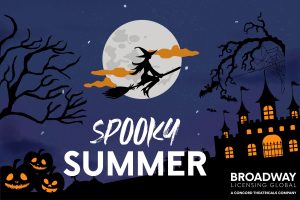Join us in celebrating the magic of World Theatre Day! 🎭✨
From the lights dimming to the final curtain call, theatre transports us to new worlds and sparks unforgettable emotions. Let’s honor the creativity, passion, and talent that bring stories to life on stage with our curated list of theatre-themed titles!
Happy World Theatre!
Musicals
The Book of Merman; Book by Leo Schwartz and DC Cathro, Music and Lyrics by Leo Schwartz
Two Mormon missionaries knock on the door of Ethel Merman and hilarity ensues in this clever new musical comedy. Audiences will fall in love with this heaven-sent journey about two men and “The Merm” with a witty original score and a heartfelt message about being true to yourself. You gotta admit— it’s way more fun than Sunday School!
Charlotte Sweet; Libretto by Michael Colby, Music by Gerald Jay Markoe
Set in Victorian England, Charlotte Sweet spotlights Charlotte, a girl with one of the highest and most beautiful soprano voices in the world. Because of her father’s debts, she is forced to leave Ludlow Ladd (her Liverpool sweetheart) and join Barnaby Bugaboo’s Circus of Voices: a troupe of freak voices including low-voiced Katinka Bugaboo, fast-voiced Harry Host, bubble-voiced Cecily Macintosh, and Skitzy Scofield (with dual personalities & voices). Becoming the troupe’s biggest sensation, Charlotte is mercilessly exploited by Barnaby until she has a vocal breakdown. Thereupon, Barnaby & his wife Katinka addict Charlotte to helium balloons in order to maintain her high notes. Only Ludlow Ladd can rescue her—in a scene full of surprises.
George M. Cohan Tonight!; Written, Arranged, and Originally Directed by Chip Deffaa
With additional material by Chip Deffaa
Meet “The Yankee Doodle Boy” himself in this upbeat one-man journey through the life, music, and artistry of this legendary entertainer. George M. Cohan Tonight! is a dazzling showcase that reveals the essence of the man, his music, and the fabulous era of show business he helped shape. With roots in vaudeville that would shape his life and career, Cohan means it when he says, “Give My Regards To Broadway,” having left an indelible mark on American theater. Featuring hit songs such as “Over There,” “Forty-Five Minutes From Broadway,” “You’re A Grand Old Flag,” and “All Aboard For Broadway,” this high-energy show is insightful and entertaining— a delightful salute to the man who almost single-handedly invented the American musical comedy.
Plays
Theatre People, or The Angel Next Door by
In this rollicking comedy, young Oliver Adams is on the brink of a major success. His novel The Angel Next Door is set to be published, and famed Broadway playwrights (and married couple) Charlotte and Arthur Sanders have already adapted his book for what is sure to be a huge stage hit. And who do they have their eye on as the leading lady? Margot Bell, of course, the very person Oliver adores and about whom he has written his novel (though he hasn’t told her yet). When they all converge for a weekend in Newport, Rhode Island, the thin walls of the well-appointed mansion reveal that the angel may not be angelic, and only the power of theatre can save the play, Oliver’s novel, and perhaps most importantly, his heart.
Act One by James Lapine, from the autobiography by Moss Hart
Growing up in an impoverished family in the Bronx, Moss Hart dreamed of being part of the glamorous world of the theatre. Forced to drop out of school at age thirteen, Hart’s famous memoir Act One is a classic Hortatio Alger story that plots Hart’s unlikely collaboration with the legendary playwright George S. Kaufman. Tony Award-winning writer and director James Lapine has adapted Act One for the stage, creating a funny, heartbreaking, and suspenseful play that celebrates the making of a playwright and his play Once in a Lifetime. Act One offers great fun to a director to utilize over fifty roles, which can be played by a cast as few as twelve, and in a production that can be done as simply or elaborately as desired.
The Play That Goes Wrong by Henry Lewis, Jonathan Sayer & Henry Shields
From Mischief, Broadway masters of comedy, comes the smash hit farce. Welcome to opening night of the Cornley University Drama Society’s newest production, The Murder at Haversham Manor, where things are quickly going from bad to utterly disastrous. This 1920s whodunit has everything you never wanted in a show—an unconscious leading lady, a corpse that can’t play dead, and actors who trip over everything (including their lines). Nevertheless, the accident-prone thespians battle against all odds to make it through to their final curtain call, with hilarious consequences! Part Monty Python, part Sherlock Holmes, this Olivier Award–winning comedy is a global phenomenon that’s guaranteed to leave you aching with laughter!
High School Edition is also available.
Shows for Days by
It’s May 1973 when a young man wanders into a dilapidated community theater in Reading, PA. The company members welcome him—well, only because they need a set painter that day. The young man then proceeds to soak up all the idealism and the craziness that comes with being part of a struggling theater company with big dreams. When a playwright looks back at his beginnings in the theater and decides to chronicle those experiences in a play, all sorts of things can happen. If you’re Douglas Carter Beane, who grew out of his Reading, PA, community theater days to become one of the stage’s master writers, it’s bound to bring a measure of gimlet-eyed reflection, a large dollop of self-deprecation, and a heaping dose of hilarity.
Angry, Raucous, and Shamelessly Gorgeous by
A lifetime ago, actress Anna Campbell and manager Betty Samson ignited a major theatrical controversy with a performance of monologues from August Wilson’s Fences that came to be known forever as Naked Wilson. After decades of self-imposed exile in Amsterdam to escape the critics, they receive an invitation to perform the show at a women’s theatre festival promising to be “angry, raucous, and shamelessly gorgeous.” Uncertain of what kind of reception she will get, and unmoved by Betty’s reassurances, Anna’s insecurity grows when she meets Pete Watson, the ambitious young performer who has been chosen to replace Anna in the role but whose theatrical experience is so far limited to the adult entertainment industry. Searching for common ground, Anna and Pete must confront their ideas about themselves and each other as they reconcile two vastly different worldviews. With humor and grace, Pearl Cleage finds a meeting place where both women can not only find each other, but make peace with a few lingering ghosts just in time for opening night.
The Book of Will by
Without William Shakespeare, we wouldn’t have literary masterpieces like Romeo and Juliet. But without Henry Condell and John Heminges, we would have lost half of Shakespeare’s plays forever! After the death of their friend and mentor, the two actors are determined to compile the First Folio and preserve the words that shaped their lives. They’ll just have to borrow, beg, and band together to get it done. Amidst the noise and color of Elizabethan London, THE BOOK OF WILL finds an unforgettable true story of love, loss, and laughter, and sheds new light on a man you may think you know.
Stage Door (Revised Edition) by Edna Ferber and George S. Kaufman
During the Depression, the Footlights Club in the West Fifties of Manhattan provides an affordable respite and community for the bevy of struggling stage actresses who reside there. They are an amusing and varied lot. The main story concerns Terry Randall, a headstrong and witty girl from the Midwest who is determined to become a leading actress on the Great White Way. While pursuing her career, she becomes involved with two completely different beaux: the left-wing arrogant playwright Keith Burgess, who eventually goes Hollywood as a screenwriter, and David Kingsley, a well-groomed elegant film producer who decides to return to Broadway. Among her co-residents at the Footlights Club are Jean Maitland, who lands the Holy Grail—a seven-year film contract; Kaye Hamilton, whose lack of stage success leads to suicide; Pat Devine, a nightclub dancer; and Linda Shaw, a society girl who shocks her mother by having an affair with a wealthy married man. Despite the vicissitudes of the theater trade, Terry sticks to her guns and wins both the leading role in a Broadway play and the affections and respect of the man she loves.
Circle Mirror Transformation by
When four lost New Englanders who enroll in Marty’s six-week-long community-center drama class begin to experiment with harmless games, hearts are quietly torn apart, and tiny wars of epic proportions are waged and won. A beautifully crafted diorama, a petri dish in which we see, with hilarious detail and clarity, the antic sadness of a motley quintet.
The Understudy by
Franz Kafka’s undiscovered masterpiece in its Broadway premiere is the hilarious and apropos setting for Theresa Rebeck’s exploration of the existential vagaries of show business and life. Charged with running the understudy rehearsal for the production, Roxanne finds her professional and personal life colliding when Harry, a journeyman actor and her ex-fiancé, is cast as the understudy to Jake, a mid-tier action star yearning for legitimacy. As Harry and Jake find their common ground, Roxanne tries to navigate the rehearsal with a stoned lightboard operator, an omnipresent intercom system, the producers threatening to shutter the show and her own careening feelings about both actors and her past. Will the show go on? THE UNDERSTUDY is a dazzling and humanistic look at people trying to do what they love in the face of obstacles that mount until all anyone can do is dance.
Evening at the Talk House by
To celebrate the tenth anniversary of the opening of an unsuccessful play, the playwright, the leading actor, the producer, and various other members of the company get together at their former haunt, the Talk House. Most haven’t been there, or even seen each other, in years, and the gossip and nostalgia are mixed with questions and accusations. Why does a washed-up old actor keep getting beaten up by his friends? Where does a failed actress-turned-waitress disappear to for months at a time? EVENING AT THE TALK HOUSE is a biting portrayal of people grasping to find their place in a world in which terror has become an accepted part of life. Is this the world we’re living in now?
Red Rex by
The sixth play in Ike Holter’s Rightlynd saga. Red Rex is a scrappy theater company that is on the brink—will they have the hit that puts their name on the map, or the wake-up call that it’s time to throw in the towel? A prodigal son actor and amateur neighborhood talent join the stage to perform a play that may or may not be based on a true story. Internal drama threatens to complicate the production further, causing fireworks both on and offstage. What else could go wrong? Complex and thought-provoking, RED REX asks us: What are we willing to sacrifice to share stories that must be heard, and where do we draw the line?
Impromptu by
Four actors sit on a darkened stage, awaiting the arrival of the stage manager who has called them together. Lacking his authoritative presence they are merely characters in search of a play to become part of, for their own personalities seem unformed and shallow next to the full-blooded figures they are used to playing. They are also “types,” and each of them has absorbed most of what he is from what he pretends to be on the stage. As they wait, the stage lights come up—but still no one appears to tell them what they are to do. They know only that they are not to leave the stage until they have “acted out the play.” Suddenly becoming aware that an audience is present, the actors decide to improvise, an idea which finds them slightly flustered. Ernest, the “leading man,” exercises the prerogative of star billing and assumes command. He plunges ahead, assigning roles to himself and his colleagues—Winifred, who always plays the “leading lady’s best friend”; Lora, the struggling ingenue; and Tony, the juvenile lead. The “drama” which unfolds is a mixture of truth, fantasy and well-rehearsed situations, but out of it, in subtle progression, comes a deepening awareness of the real people behind the theatrical facades.
The Actor’s Nightmare by
Having casually wandered onstage, George is informed that one of the actors, Eddie, has been in an auto accident and he must replace him immediately. Apparently no one is sure of what play is being performed but George (costumed as Hamlet) seems to find himself in the middle of a scene from Private Lives, surrounded by such luminaries as Sarah Siddons, Dame Ellen Terry and Henry Irving. As he fumbles through one missed cue after another the other actors shift to Hamlet, then a play by Samuel Beckett, and then a climactic scene from what might well be A Man for All Seasons—by which time the disconcerted George has lost all sense of contact with his fellow performers. Yet, in the closing moments of the play, he rises to the occasion and finally says the right lines, whereupon make-believe suddenly gives way to reality as the executioner’s axe (meant for Sir Thomas Moore) instead sends poor George to oblivion—denying him a well-earned curtain call.
The Musical Comedy Murders of 1940 by
The creative team responsible for a recent Broadway flop (in which three chorus girls were murdered by the mysterious “Stage Door Slasher”) assemble for a backer’s audition of their new show at the Westchester estate of a wealthy “angel.” The house is replete with sliding panels, secret passageways, and a German maid who is apparently four different people—all of which figure diabolically in the comic mayhem which follows when the infamous “Slasher” makes his reappearance and strikes again—and again. As the composer, lyricist, actors, and director prepare their performance, and a blizzard cuts off any possible retreat, bodies start to drop in plain sight, knives spring out of nowhere, masked figures drag their victims behind swiveling bookcases, and accusing fingers point in all directions. However, and with no thanks to the bumbling police inspector who snowshoes in to investigate, the mystery is solved in the nick of time and the “Slasher” unmasked—but not before the audience has been treated to a sidesplitting good time and a generous serving of the author’s biting, satiric, and refreshingly irreverent wit.
The Grand Manner by
In 1948, playwright A.R. Gurney, then a young boarding-school student, traveled to New York where he attended a performance of Shakespeare’s Antony and Cleopatra, going backstage afterwards to meet the production’s star, the great stage actress Katharine Cornell, who was dubbed “The First Lady of the American Stage” by the legendary critic Alexander Woollcott. A mix of remembrance and imagination, The Grand Manner is a love letter to this fabled actress and a heartfelt look back at the glorious heyday of the Broadway theatre.
The Nance by
In the 1930s, burlesque impresarios welcomed the hilarious comics and musical parodies of vaudeville to their decidedly lowbrow niche. A headliner called “the nance” —usually played by a straight man—was a stereotypically camp homosexual and master of comic double entendre. The Nance recreates the naughty, raucous world of burlesque’s heyday and tells the backstage story of Chauncey Miles and his fellow performers. At a time when it was easy to play gay and dangerous to be gay, Chauncey’s uproarious antics on the stage stand out in marked contrast to his offstage life.
It’s Only a Play by
It’s the opening night of The Golden Egg on Broadway, and the wealthy producer Julia Budder is throwing a lavish party in her lavish Manhattan townhouse. Downstairs the celebrities are pouring in, but the real action is upstairs in the bedroom, where a group of insiders have staked themselves out to await the reviews. The group includes the excitable playwright; the possibly unstable wunderkind director; the pill-popping leading lady, treading the boards after becoming infamous in Hollywood; and the playwright’s best friend, for whom the play was written but who passed up this production for a television series. Add to this a drama critic who’s panned the playwright in the past and a new-in-town aspiring singer, and you have a prime recipe for the narcissism, ambition, childishness, and just plain irrationality that infuse the theatre—and for comedy. But don’t worry: This play is sure to be the hit they have all been hoping for.
Open by
Open is a magic act that reveals itself to be a resurrection. A woman called the Magician presents a myriad of tricks for our entertainment, yet her performance seems to be attempting the impossible—to save the life of her partner, Jenny. But is our faith in her illusions enough to rewrite the past? The clock is ticking, the show must go on, and, as impossible as it may seem, this Magician’s act may be our last hope against a world filled with intolerance and hate.
Yellow Face by
The lines between truth and fiction blur with hilarious and moving results in David Henry Hwang’s unreliable memoir. Asian-American playwright DHH, fresh off his Tony Award win for M. Butterfly, leads a protest against the casting of Jonathan Pryce as the Eurasian pimp in the original Broadway production of Miss Saigon, condemning the practice as “yellowface.” His position soon comes back to haunt him when he mistakes a Caucasian actor, Marcus G. Dahlman, for mixed-race, and casts him in the lead Asian role of his own Broadway-bound comedy, Face Value. When DHH discovers the truth of Marcus’ ethnicity, he tries to conceal his blunder to protect his reputation as an Asian-American role model, by passing the actor off as a “Siberian Jew.” Meanwhile, DHH’s father, Henry Y. Hwang, an immigrant who loves the American Dream and Frank Sinatra, finds himself ensnared in the same web of late-1990’s anti-Chinese paranoia that also leads to the “Donorgate” scandal and the arrest of Los Alamos nuclear scientist Wen Ho Lee. As he clings to his old multicultural rhetoric, this new racist witch hunt forces DHH to confront the complex and ever-changing role that “face” plays in American life today.
Stupid Fucking Bird by
An aspiring young director rampages against the art created by his mother’s generation. A nubile young actress wrestles with an aging Hollywood star for the affections of a renowned novelist. And everyone discovers just how disappointing love, art, and growing up can be. In this irreverent, contemporary, and very funny remix of Chekhov’s The Seagull, Aaron Posner stages a timeless battle between young and old, past and present, in search of the true meaning of it all. Original songs composed by James Sugg draw the famously subtextual inner thoughts of Chekhov’s characters explicitly to the surface. STUPID FUCKING BIRD will tickle, tantalize, and incite you to consider how art, love, and revolution fuel your own pursuit of happiness.
The Seagull by Anton Chekhov, in a new version by Christopher Hampton
The Seagull is one of the great plays about writing. It superbly captures the struggle for new forms, the frustrations and fulfillments of putting words on a page. Chekhov, in his first major play, stages a vital argument about the theatre that still resonates today.
Fairview by
Winner of the 2019 Pulitzer Prize for Drama
At the Frasier household, preparations for Grandma’s birthday party are underway. Beverly is holding on to her sanity by a thread to make sure this party is perfect, but her sister can’t be bothered to help, her husband doesn’t seem to listen, her brother is MIA, her daughter is a teenager, and maybe nothing is what it seems in the first place…! FAIRVIEW is a searing examination of families, drama, family dramas, and the insidiousness of white supremacy.
Indecent by
Indecent, by Pulitzer Prize-winning playwright Paula Vogel, is a deeply moving play inspired by the true events surrounding the controversial 1923 Broadway debut of Sholem Asch’s God of Vengeance—a play seen by some as a seminal work of Jewish culture, and by others as an act of traitorous libel. INDECENT charts the history of an incendiary drama and the path of the artists who risked their careers and lives to perform it.
Deadline by Marcia Kash, Douglas E. Hughes
A team of two struggling playwrights has just found out their longed-for production is canceled. While stewing in their righteous grief, their agent informs them that their idol, the most celebrated murder-mystery writer since Agatha Christie, has died with the script to his upcoming Broadway thriller left unfinished. Tasked with completing his work in under a week, Mara and Don jump into the story—and soon find themselves characters in the unresolved caper. Can they use their love of the genre and writing skills to solve the mystery and become the toast of Broadway?
Long Live Love by Don Zolidis
It’s opening night for Long Live Love, a drawing room comedy about a marriage squabble where everything turns out happy in the end. But hours before the curtain is set to go up, George Harold, one of the show’s two playwrights, rushes in with a new, much more cynical version of the script he wrote in an angry, drunken haze. As the actors scramble to add a tragic ending to their romantic farce, Marjorie Bright, the other playwright—and George’s wife—arrives with a new new ending for the show. Now the actors are stuck in an impossible situation, trying to piece together a working script from the remains of the playwrights’ marriage. Long-lost children, mistaken identities, and sword fights abound in Long Live Love—and that’s just behind the scenes.
The Audition by Don Zolidis
A new theater teacher is bringing a production of A Chorus Line to the high school. Though the hopefuls range from shy to outrageous, and from diva-like to determined, everyone has a chance to step into the spotlight. A hilarious and heartbreaking look at the madness of auditioning and the actors who brave the process for that perfect part.
Merely Players by Steve Borowka
It’s the beginning of the new school year at Evergreen Academy. Emma, a content creator becoming more popular by the day, is challenged by head cheerleader Stacy to matchmake five couples at the school by the end of the month—or lose access to her social media accounts. When her class is assigned a sonnet-writing project, Emma thinks it’ll help her win the bet, until she realizes everyone has devoted their sonnet to the wrong person. With echoes of Cyrano de Bergerac, As You Like It, and Jane Austen’s Emma, Merely Players is a modern take on one of Shakespeare’s most timeless truths: the course of true love never did run smooth.





